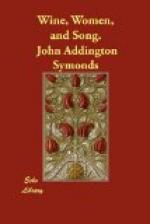“Of what is’t
fools make such vain keeping?
Sin their conception, their
birth weeping,
Their life a general mist
of error,
Their death a hideous storm
of terror.”
The contempt of the world is the chief theme of edification. A charnel filled with festering corpses, snakes, and worms points the preacher’s moral. Before the eyes of all, in terror-stricken vision or in nightmares of uneasy conscience, leap the inextinguishable flames of hell. Salvation, meanwhile, is being sought through amulets, relics, pilgrimages to holy places, fetishes of divers sorts and different degrees of potency. The faculties of the heart and head, defrauded of wholesome sustenance, have recourse to delirious debauches of the fancy, dreams of magic, compacts with the evil one, insanities of desire, ineptitudes of discipline. Sexual passion, ignoring the true place of woman in society, treats her on the one hand like a servile instrument, on the other exalts her to sainthood or execrates her as the chief impediment to holiness. Common sense, sanity of judgment, acceptance of things as they are, resolution to ameliorate the evils and to utilise the goods of life, seem everywhere deficient. Men are obstinate in misconception of their proper aims, wasting their energies upon shadows instead of holding fast by realities, waiting for a future whereof they know nothing, in lieu of mastering and economising the present. The largest and most serious undertakings of united Europe in this period—the Crusades—are based upon a radical mistake. “Why seek ye the living among the dead? Behold, He is not here, but risen!” With these words ringing in their ears, the nations flock to Palestine and pour their blood forth for an empty sepulchre. The one Emperor who attains the object of Christendom by rational means is excommunicated for his success. Frederick ii. returns from the Holy Land a ruined man because he made a compact useful to his Christian subjects with the Chief of Islam.




